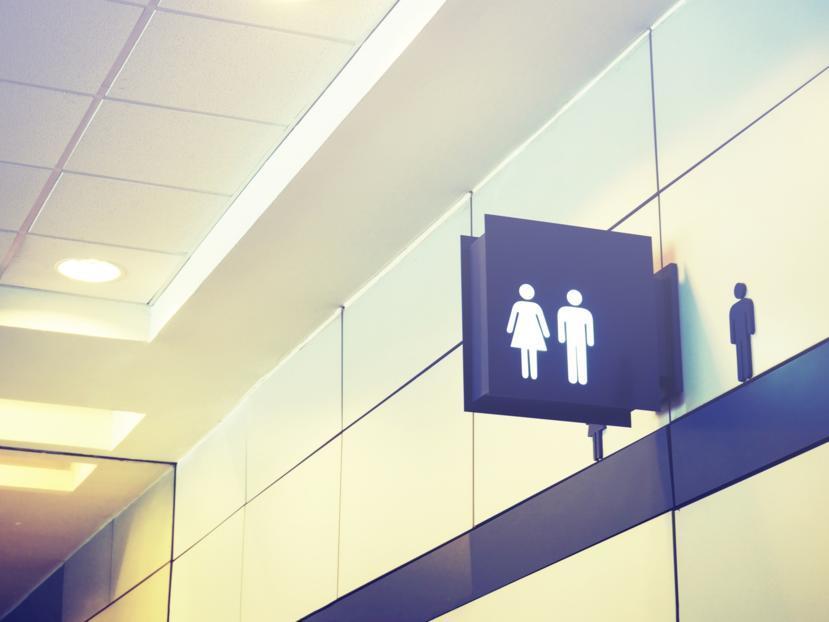Crohn’s & Colitis Foundation Applauds New York State Restroom Access Legislation

People with Crohn’s and colitis understand the pain of being stuck in public with no restrooms available. The need to visit the restroom can be great, but nothing is publicly available, and upon asking an employee: “Sorry, there are no public restrooms in this building.”
Perhaps because of this, people with Crohn’s and colitis have an aversion to leaving home. Flare-ups can be sudden, and the need to use the restroom imminent, making it dangerous to leave the safety of the restroom behind. It is not unknown for people with ulcerative colitis or Crohn’s disease to avoid leaving their home, just in case.
After all, soiling yourself in public can be rather embarrassing. If you are prone to flare-ups, few people would fault you for wanting to avoid such situations.
In New York state at least, a law is being passed which will bring relief to people with Crohn’s or colitis.
The Law
Bill number S3295 (in the senate) and A1982 (in the assembly) is also known as the “Crohn’s and Colitis Fairness Act.” The intent of the bill is to provide access to restrooms to people with certain medical conditions which were previously only available to employees.
Generically, such laws are known as Restroom Access Acts, and have been passed in a few states. They are also known as Ally’s Law, for a reason we will discuss below.
Basically, if you have Crohn’s disease or colitis and feel the sudden need to use the toilet, you can go into a publicly accessible building without a public restroom and use the private one.
This does not mean that you can just waltz into a secret government facility, military base, or other such prohibited location. The legislation only applies to facilities already open to the public.
Also, the restroom has to be in a place where bringing a member of public inside cannot cause a health or safety risk to either the employees or the person with the medical issue. Do not expect to be able to use the law as an excuse to visit a construction site.
Visiting the private restroom also cannot cause a security risk to the facility. So please, do not attempt to use the bill to visit any top-secret research laboratories. Bringing you in would be a security risk.
You also will not be able to request to use the private restroom if there is a public one freely available. The goal of the law is to cover emergencies, not convenience.
Also, existing public facilities with no public restrooms are not required to make any modifications. They just have to comply when asked by an eligible requester, so long as there are two or more employees available at the time of the request.
The senate version of this law was sponsored by Kemp Hannon, and was co-sponsored by David Carlucci, Simcha Felder, Brad Hoylman, Kathleen A. Marchione, Kevin S. Parker, and Joseph E. Robach. The assembly version was sponsored by Paulin and was co-sponsored by Jeffrey Dinowitz, Sandy Galef, Jose Rivera, Andrew Hevesi, Patricia Fahy, Shelley Mayer, and David Weprin.
Who Can Use the Law?
The Crohn’s and colitis fairness act covers who is eligible to use private restrooms when no public restroom is available.
Crohn’s disease is the first one named, followed by ulcerative colitis. Irritable bowel syndrome is also named. The bill also states that anyone with an inflammatory bowel disease, or indeed any other medical condition that causes the person to require immediate access to the restroom, is covered by the law.
An ostomy device is also a legal qualifier for being able to request services using the law.
At the time of this writing, the legislation has not yet been signed into law. It has passed both the senate and the assembly, but still needs to be delivered to the governor and then signed. Chances are very good that he will do so.
History and Ally’s Law
For a long time, people with Crohn’s, colitis, irritable bowel syndrome, or other inflammatory bowel diseases had to make do while in the public. Friends and family would know about their troubles with failing to find adequate public facilities, but their plight often went under the public eye.
Unfortunately, a fourteen-year-old girl from Illinois found attention when she was denied the use of a private restroom during a Crohn’s disease flare-up. Her mother was incensed about the embarrassment that had befallen her daughter, and became determined that no one else should meet with the same fate.
The two met with Kathy Ryg, then an Illinois State Representative, and the three of them drafted a bill. After testifying for a committee, the bill was signed into law during August 2005. It was called Ally’s Law.
The Crohn’s & Colitis Foundation teamed up with Ally, and is working to bring that law to other states. In fact, they have been successful in a handful of states.
The following states have successfully passed and signed into law a version of the Restroom Access Act: Colorado, Connecticut, Delaware, Illinois, Kentucky, Maine, Maryland, Massachusetts, Michigan, Minnesota, Ohio, Oregon, Tennessee, Texas, Washington, and Wisconsin.
As of the time of this writing, Restroom Access Acts have also been introduced into other states, these being Arkansas, Florida, New Jersey, New Mexico, Oklahoma, Pennsylvania, Virginia, and West Virginia. They have not yet been passed, however.
Not all of the laws have taken the same structure. For example, the version introduced in Virginia included a fine for non-compliance, but was shelved because the worded potentially opened up businesses without public restrooms to abuse.
The New York version of the law was first introduced in the 2009-2010 legislative session. It was modified and introduced in every legislative session afterward, but only now has it left the committee to pass through the senate and assembly. Once it is signed, it will take one hundred and twenty days to go into effect.
There has even been talk about a federal Restroom Access Act, but support has been low. Small business owners have a tendency to be cautious about allowing the public to use their restrooms.
You Can Help
With seventeen states down, that still leaves thirty-three states in which people with Crohn’s disease, colitis, or other bowel problems can be turned away by the employees of facilities with no public restrooms, even if there is a perfectly safe private restroom nearby.
Obviously, this needs to change. Because this is a democratic country, you can help. Contact your representatives and implore them to pass Restroom Access Acts in your state.
If you have Crohn’s, colitis, or another inflammatory bowel disease, and you have direct experience with a lack of public restroom access interfering with your life, you could be a prime candidate for testifying before a committee. That could potentially help push a bill through to becoming a law, and helping thousands of people with similar medical issues.
Restroom Access Cards
If you live in a state which has passed a Restroom Access Act, or even live in one without but want to try to talk to employees to gain access to private restrooms anyways, it may help to carry with you a restroom access card.
A website called The IBD Life has started an initiative to provide these cards to people with an inflammatory bowel disease, to help them get access to private restrooms. Not every employee may be aware of their legal obligations, and having such a card may help.
Official looking cards do carry weight in the eyes of most people. Showing this card may be easier than talking to someone while also trying to hold in a flare-up, a very challenging task. Especially since some people may be concerned about your disease, the card makes sure to mention that such diseases are not contagious.
If you are interested, please visit: http://www.theibdlife.com/access/
The Bottom Line
People with Crohn’s, colitis, or other inflammatory bowel diseases will find relief in New York after this law is signed and passed into law. People in a few other states already have this right, but most states have yet to pass such legislation. Perhaps with your help, your state will pass such a law, and going out in public will no longer be such a scary thought.
References
http://www.crohnscolitisfoundation.org/news/ny-restroom-access.html
https://www.nysenate.gov/legislation/bills/2017/s3295/
















